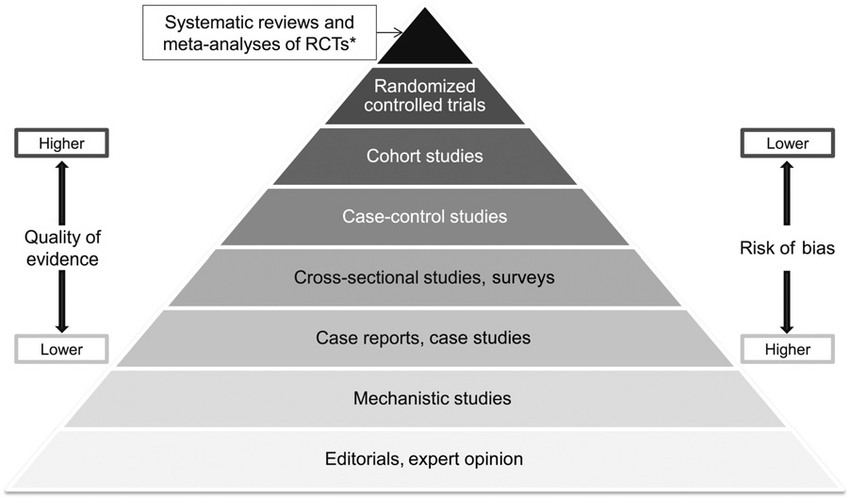OnCore Nutrition - Two Peas in a Podcast
Episode 24: Good Science Vs Bad Science
Episode Summary
How never to be tricked by click bait again
Episode Notes
What makes something worth reading?
- Population
- Findings
- Types of studies - epidemiological, vs clinical trial etc..
To really understand a study you need to read more than just the abstract. The abstract is a great introduction however doesn’t give us enough context or information.
Each of the different studies have their own strengths and weaknesses.
To summarise:
- Evidence Summaries (Systematic Reviews and Meta-analysis)
- Experimental studies (RCT’s and non-RCT’s)
- Observational studies (case control, case report, cohort study)

Source: https://www.researchgate.net/publication/311504831_Options_for_basing_Dietary_Reference_Intakes_DRIs_on_chronic_disease_endpoints_report_from_a_joint_US-Canadian-sponsored_working_group
CASP (and other critical appraisal) tools
https://casp-uk.net/casp-tools-checklists/
- Type of study - RCT vs cohort/observational vs systematic review vs case control. In vitro (test tube) vs in vivo, Animal vs human
- Randomized, double-blind, placebo-controlled trials = gold standard
- Aims and study qn
- How were subject recruited?
- Randomisation and blinding
- Population size + power of the findings - the bigger the sample size, the more reliable the study is.
- Demographics - age, sex, health status - this will help you indetify if the paper is relevant to you or your client group. No point in drawing inferences from a paper which looks at muscle mass in an elderly population group if the group you work with are <30 years old.
- Confounder - a factor that may influence the results. E.g. if you’re looking at Vitamin C levels and immune function, you would want to ensure the group you’re looking at aren’t already on supplements while the others aren't on anything. These people should be excluded from the study as they may influence the results.
- If not RCT, measures to minimise bias? Observer and subject bias. Social conformity.
- What methods were used? The methods section should have a clear endpoint - we want to clearly know what the researchers are trying to find - e.g. effect of the keto diet on weight loss or resistance training on muscle gain.
- Similarity of the groups at baseline - heterogeneous sample size
- Did anything else differ between groups other than the intervention?
- Size of the effect - clinical vs statistical significance. This can be confusing for the general population. E.g. we may see improvements in clinical outcomes when looking at nutrition interventions prior to cancer surgery, however the results were not ‘statistically significant’.
- P-value (probability of obtaining the observed results of a test)
- How long was the intervention or follow up? E.g. 6/12 for weight loss - perhaps not long enough! What happens in 5 years?
- Consistency with other high quality evidence
- Application of results to local population or groups
- Harms and costs
- Funding
- COI - often mentioned at the end of the pape
What to do when you’re not sure if something is being honest or true: Fight back against the click bait.
- Warning signs
- Selling something - food or supplement companies often cherry pick information - be aware of this!
- Lack of credentials
- Lack of references - skeptical even if accurate
- Alarmist
- Promise to cure / prevent
Is loaded with ‘testimonials’ (did you know that registered health professionals is Australia aren’t allowed to include
testimonials? This is because we base our advice on best-practice evidence rather than individual cases. What works for Sam won’t necessarily be right for Sally!)
- Makes no mention of seeking individual advice
- If it sounds too good to be true, it probably is!
- Headlines
- How to cross check when you’re not sure.
- The best advice? Check anything you’re interested in trying, taking, applying with your training, governed health care professionals. And if you don’t get an answer from one, as, another!
- If you’re game, read a number of studies on the same topic
Social conformity
https://www.npr.org/2016/09/17/494360187/industry-influence-in-nutrition-research
https://www.google.com/amp/s/amp.theguardian.com/lifeandstyle/2016/dec/12/studies-health-nutrition-sugar-coca-cola-marion-nestle
https://jamanetwork.com/journals/jamainternalmedicine/article-abstract/2548255
Three applied examples
https://www.medicalnewstoday.com/articles/327046.php#1
https://www.sciencedaily.com/releases/2014/12/141203161134.htm
https://www.telegraph.co.uk/news/2017/08/29/low-fat-diet-linked-higher-death-rates-major-lancet-study-finds/